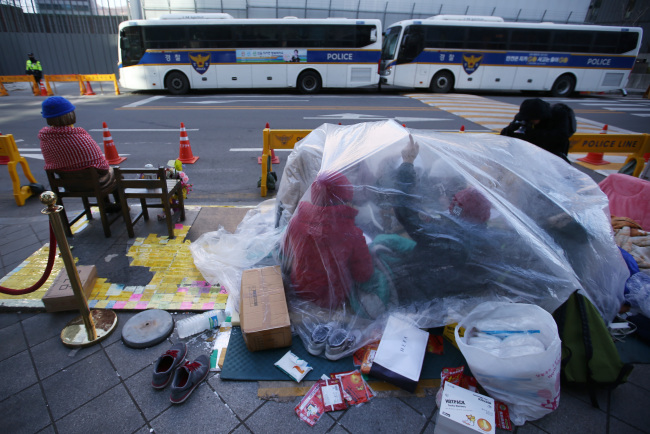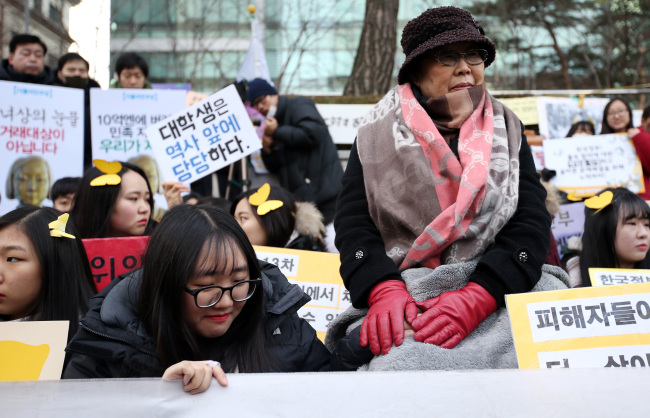[From the scene] Student sit-in shields ‘comfort woman’ statue
By KH디지털2Published : Jan. 27, 2016 - 15:36
On Wednesday morning about 10 students in their 20s woke up to another morning in the biting cold, checking on the “comfort woman” statue next to them.
For the past 29 days, an association of 16 university councils and students’ groups has staged a sit-in day and night to guard the life-size bronze statue symbolizing victims sexually enslaved by Japan during World War II. A team of about 10 to 20 students spend the night across the street from the Japanese Embassy in Seoul, taking turns watching over the statue.
“It is really cold to spend the night here. We use sleeping bags and put several disposable heat packs inside,” said a 27-year-old student, who asked to be identified only by his surname Lee. He spent a total of three nights next to the statue in the past month. “At first, we couldn’t sleep and stayed up all night. But we gradually adapted to the situation and now are good at it.”
For the past 29 days, an association of 16 university councils and students’ groups has staged a sit-in day and night to guard the life-size bronze statue symbolizing victims sexually enslaved by Japan during World War II. A team of about 10 to 20 students spend the night across the street from the Japanese Embassy in Seoul, taking turns watching over the statue.
“It is really cold to spend the night here. We use sleeping bags and put several disposable heat packs inside,” said a 27-year-old student, who asked to be identified only by his surname Lee. He spent a total of three nights next to the statue in the past month. “At first, we couldn’t sleep and stayed up all night. But we gradually adapted to the situation and now are good at it.”

The sit-in comes as Japan has pressured South Korea to remove the statue as part of the Dec. 28 settlement over the “comfort women” issue, or Japan’s sexual enslavement of Korean women. The Seoul government has insisted the relocation of the comfort women statue was beyond their authority, as it was built by civic groups.
In the diplomatic deal defined as “final and irreversible” by both countries, Japan agreed to provide 1 billion yen ($8.45 million) to a Korean-run foundation for the 46 surviving victims. In return, Seoul promised not to raise the issue again in international forums and consult with civic groups to relocate the statue if Tokyo fulfills its commitments.
The statue has since become a rallying point for the victims and their supporters who have refused to accept the deal, prompting the students to hold a sit-in to protect it from being taken down.
Undeterred by the subzero temperatures, the students who spent the night on the pavement exchanged jokes and laughter, with some of them heading to a nearby restaurant to grab breakfast.
Bundling himself up in thick jacket, Lee asked his friends to join him on the electronic heating pad. “Come join me under the blankets!” he called out.
According to the students, at least 30 to 40 people come and offer such things as energy drinks, warm food, heat packs and blankets every day to display their support. The opposition lawmakers including Seoul Mayor Park Won-son and The Minjoo Party of Korea's floor leader Lee Jong-Kul also visited the site.
"The lawmakers come and take pictures with us, asking us whether we need anything," Lee said. "But what we really need is not food or tents. We want the politicians to pass a bill invalidating the deal.”
“I hope that adults know that we are risking our lives and take action, rather than just say ‘sorry’ to us.”
Lee Yang-sun, a 21-year-old student at Choongang University, traveled for hours from Ulsan to join the sit-in during the day.
“My parents would not be happy with me being here in the cold. I didn’t tell them I was coming here,” Lee said. “But I came because I would forever feel ashamed if I did nothing to properly solve the issue.”
“The tarnished honor and human rights of the grandmothers cannot be restored by money,” she said. “I am angrier at my government (than at Japanese authorities). Shouldn’t the government take the side of the victims?”
The students plan to continue the sit-in for now and hold a large-scale demonstration at Seoul Plaza on Saturday, expecting to draw about 1,000 citizens and students.
Kim Seong-soo, 40-something man who was walking past the statue, stopped at the scene to pay respect to the statue and signed a petition calling for the deal’s annulment. “What can one say other than ‘sorry?’ Our generation should have solved the issue, but we are passing the burden onto the next generation. I feel bad.”
The students’ sit-in has attracted more attention in recent weeks as police barred them from setting up tents near the statue, citing the Road Traffic Act. The law prohibits putting items on the sidewalk without a permit from the government.
Six of the students have been brought in for questioning by police on charges of violating the Public Assembly Act, as they held a sit-in in front of a foreign embassy, used a microphone and collectively chanted slogans.
The victims have denounced the “comfort women” settlement as a political collusion between Seoul and Tokyo, vowing not to take the money from the Japanese government unless it admits to its state-led war crimes and offers legal compensation. Their advocacy groups have instead set up their own foundation called “Justice and Memory” to collect donations.
Criticism against the settlement mounted Tuesday as a Japanese media outlet reported that Japan’s ruling party lawmakers wrote a resolution to urge the Korean government to take down the statue as soon as possible.
According to a survey of 1,000 Japanese by Sankei Shimbum, 64 percent of them believed that the removal of the statue was a precondition for Japan to pay 1 billion yen into the fund.
In response, the Foreign Ministry renewed its stance in a news briefing that the government cannot decide on the relocation of the statue. It said it will continue to visit victims to consult them.
The weekly rally against the deal continued Wednesday as an estimated 1,000 people flocked to the narrow street across from the Japanese Embassy to participate in the 1,215th demonstration led by the Korean Council for the Women Drafted for Military Sexual Slavery.
Lee Yong-soo, an 88-year-old former comfort woman, slammed President Park Geun-hye for ignoring the victims’ voices.

“Many young people were sacrificed to make Korea what it is now. But what is President Park Geun-hye doing now?” Lee posed. “She is like a vicious stepmother, no? She is selling us out to Japan. She should be kicked out of Korea.”
Meanwhile, two other victims are currently on a visit to Japan to offer their testimonies about past experiences as sex slaves.
“Imagine serving 40 to 50 men a day. One would rather wish to die. It is not a comfort station. It is a place of execution,” former comfort woman Lee Ok-seon, 90, told some 200 Japanese spectators at the parliament in Tokyo on Tuesday.
“If we voluntarily went to Japan to earn money, why would we now demand an apology and compensation like this? Think about it,” urged Lee, who was dragged to China as a teenage girl. “We are furious. They attempt to give us some money to shut our mouth. It can never happen."
"Choose whether to remove us, or the comfort women statute. Why would you get rid of it?"
By Ock Hyun-ju (laeticia.ock@heraldcorp.com)


















![[Today’s K-pop] Treasure to publish magazine for debut anniversary](http://res.heraldm.com/phpwas/restmb_idxmake.php?idx=642&simg=/content/image/2024/07/26/20240726050551_0.jpg&u=)